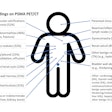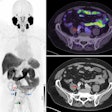
Lab tests for plasma tau protein (p-tau217) could be used as a complement to PET imaging for selecting clinical trial participants to test new Alzheimer's disease treatments, according to a study published February 6 in JAMA Neurology.
An international group led by Dr. Niklas Mattsson-Carlgren, PhD, of Lund University in Sweden, studied data from participants enrolled in two previous large clinical trials and found that p-tau217 levels predicted which unimpaired patients were more likely to experience cognitive decline.
"These findings suggest that plasma p-tau217 may be used as a complement to [cerebral spinal fluid] or PET for participant selection in clinical trials of novel disease-modifying treatments," the group wrote.
Enrolling enough patients in drug trials for Alzheimer's disease has proven challenging based on brain PET imaging alone, as PET is more expensive and inaccessible for many people, according to the authors.
Recent research suggests that tau plasma biomarkers have high accuracy for diagnosing early Alzheimer's disease, as the biomarker is associated with beta-amyloid plaque deposits (a hallmark of the disease) on brain PET imaging. However, the predictive abilities of these biomarkers in cognitively unimpaired individuals who are positive for amyloid plaque on PET imaging have not been studied, the researchers wrote.
To investigate whether p-tau127 can predict cognitive decline, the researchers analyzed data from 564 eligible amyloid-positive, cognitively unimpaired patients who participated in two previous clinical trials. Of these, 171 participants with data required for the study were included in the main analyses.
The primary outcome was cognitive change in patients over a median of six years (range, 2-10 years) using two standard clinical exams, the Mini-Mental State Examination (MMSE) and the modified Preclinical Alzheimer Cognitive Composite (mPACC). Over time, changes in cognition based on these exams were associated with baseline p-tau217 levels in a predictive linear regression model.
The analysis revealed that p-tau217 was the strongest individual plasma biomarker to predict both mPACC slopes and MMSE slopes for patients based on longitudinal changes in cognition, the researchers found.
Ultimately, the study found that plasma P-tau217 effectively predicted cognitive decline in individuals with preclinical Alzheimer's disease and the study's novelty is that it highlights the potential of easily available blood tests to increase the power of clinical trials, the authors wrote.
"Our results support the inclusion of plasma p-tau217 as a component of efficient and scalable screening tools," the authors concluded.





















